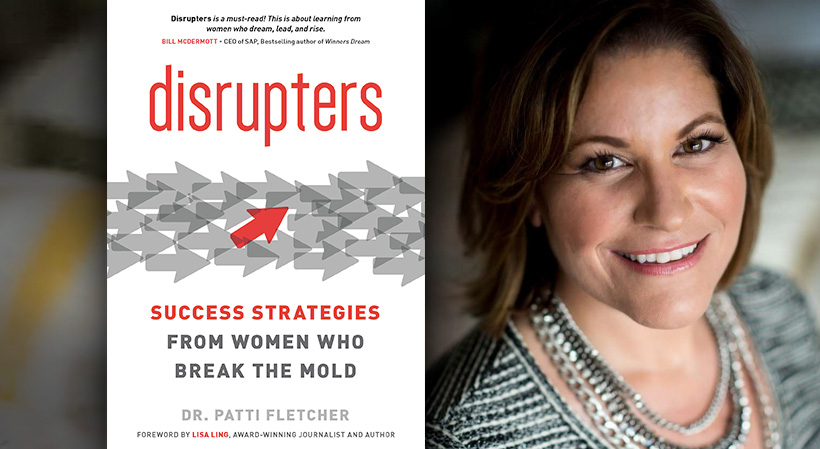The following is excerpted from “Disrupters: Success Strategies from Women Who Break the Mold” by Dr. Patti Fletcher (Entrepreneur Press; January 16, 2017).
You know the old saying: “It’s not about what you know, it’s about who you know.” If only it were that easy. In order to succeed in high-stakes business, the real differentiator lays in who knows you. And, that, my friend, requires you to build relationships while building your brand.
Networking. We’re talking about networking here.
Not the “let’s go eat crappy finger food at a local networking event and hand out business cards” kind but strategic networking: searching for, identifying and investing in long-term relationships.
Women need skills and personal capital, but social capital is more important. We need help from below us, beside us and above us. Everyone needs help, but few women understand how important relationships truly are. We don’t live in a meritocratic world; never have and never will. We do live in a world where word-of-mouth is still the most powerful referral tool.
In PricewaterhouseCooper’s 2016 “Women in the Workplace” report, the study found that men were more networked with other men than women were. While that’s a no brainer, they were able to put the numbers to it:
- Men: 37 percent networked mostly with other men; 9 percent, mostly women; 55 percent, equal split
- Women: 27 percent networked mostly with other women; 27 percent, mostly men; only 45 percent, equal split
Because the upper echelons of organizations are overwhelmingly male, this means that fewer women are networked with the people who can introduce them into these arenas.
Related: Choosing Your Best Pathway to Purpose Through Entrepreneurship
While this may seem self-explanatory—”it’s not what you know, it’s who you know”—this concept of strategic networking is profoundly important for women.
Those successful VC-funded startups, landing billions of dollars in capital? Their social networks play a huge part in their successful financing. Those CEOs and new appointees to the board of directors? Networked. Friends of friends. Good ol’ boys network.
In fact, a 2016 study found that a woman more than doubles her chances of serving on a publicly-traded company in Singapore if she plays golf.
I don’t ascribe to the conspiracy theories that there are a handful of people controlling the world. This isn’t planned. It’s just natural. Or not. I don’t know. Here’s what we do know: while boards of directors may employ headhunters to find qualified candidates for board seats or executive positions, the roles are often filled by the recommendation of some stakeholder of the organization. In the very least, the candidate is often vouched for by “a friend of a friend.”
My observation is that nearly all board seats are filled from, or at the very least influenced by referral. Your network is everything. Women and other minorities aren’t part of the dominant corporate culture. As such, they start on the outside and have to eventually work their way in.
Or bypass them altogether.
Try the new way to “network”
I can’t tell you how many impressive, accomplished, high-ranking women I’ve talked to, mentored, or coached who admitted they have imposter syndrome: they feel like a fraud and live in almost constant fear that someone is going to find them out.
This isn’t healthy—but it is normal. Unfortunately, these feelings of inadequacy can lead you to feel like you have to make it on your own. You don’t.
What do our rule-breakers do to achieve the success they want? They create their own networks of like-minded people who are committed to mutual support—not the transactional what-can-you-do-for-me-now type of networking we usually see.
I cringe when I get an email from a complete stranger that says, “Hey, I see that you’re an accredited investor. Would you like to invest in my business?” No introduction, no references, no relationship. That’s not the kind of networking we’re talking about here.
In talking about gaining access to be invited to board of directors, one of my research interviewees said, “Networking is the time you commit to developing a business-personal relationship with someone…It’s a mutual commitment between two people who develop this relationship that has no immediate benefit.” In fact, most of the women who do this don’t even think of it as networking. It’s just about having relationships.
In “Stiletto Network,” author Pamela Ryckman profiles groups of women-focused groups springing up across the globe. What Pamela noted was how intimate these groups were. In addition to discussing business, they talk about their fears in life and business, and create genuine friendships. Instead of putting on the masculine façade women are told to, they are comfortable in their own form of femininity. In addition, they were incredibly open and willing to connect Pamela with others who, in turn, introduced her yet to still more (leading to the book itself).
What I love about Pamela’s examples is that these groups of women aren’t focused on helping each other climb the corporate ladder. They focus on the mutual support of each woman’s goals, whatever that looks like.
That comes back to the central theme of “Disrupters”: success isn’t about becoming a CEO or getting on the board of directors. It’s about identifying a life that works for you, identifying a lifestyle that fits those goals and then finding the help you need to achieve that.
In her Woman of the Year acceptance speech, Madonna said, “As women, we have to start appreciating our own worth and each other’s worth. Seek out strong women to befriend, to align yourself with, to learn from, to collaborate with, to be inspired by, to support, and be enlightened by.”
Women have to define their own path to success. Once they do, they can identify others who share a similar life vision. Then they can form a network of like spirits to help each reach those similar goals.
Forget networks—focus on relationships
Like mentoring programs and diversity initiatives, women’s leadership and/or networking associations usually fail to deliver on their promise.
I’ve never found a woman yet who sincerely enjoyed going to networking events. Who feels awesome holding a glass of cheap Chardonnay while exchanging business cards and superficial niceties?
Thankfully, we can stop. The empirical and anecdotal evidence says it just doesn’t help. In fact, none—zero—of my “Disrupters” subjects spent time pursuing this kind of networking.
What makes a difference is in finding women with whom you can have genuine relationships—women who will support you, advise you, encourage you, advocate for you, and go to bat for you. (Pamela Ryckman’s “Stiletto Network” does a fabulous job in showing all the different forms that’s taking across the world).
Sign Up: Receive the StartupNation newsletter!
Our wonder women don’t just network inside their industry. They purposely cultivate a network that spans multiple industries. When one executive, formerly the CEO of a software company, sought to be on the board of directors of another company, she looked outside of IT. “I want to keep learning. I could be valuable to a software company, but I want to move out of my comfort zone. That’s really the only way you grow,” she told me.
This isn’t a sexist call to create a “no boys allowed” club. More often than not, the strategic relationships of our heroines include men (like Vivek Wadhwa, recognized in 2015 by the Financial Times as “one of ten men worth emulating in his support of women”). Ideally, a network comprises a healthy representation of not just both genders but a cross-cut of people from diverse industries, backgrounds, skill sets, positions, ethnicities and more.
There are many men who do get it. Men who use their voices and their checkbooks to level the playing field. Among the enlightened who don’t just talk but also act are the founder of investment firm Lucas Point Ventures Adam Quinton, investor Brad Feld, Canadian prime minister Justin Trudeau, Warren Buffet, Bill Gates and SAP CEO Bill McDermott. These men get it. They value what women bring to the table. They talk the talk and walk the walk.
Cultivating relationships is an ongoing process. One woman told me, “You know, I keep running into this former comptroller of a large company. She has the same skills I do, but she’s only on one board. When she says how much she’d like to get on another, I ask, ‘How much networking are you doing?’ She says, ‘Oh, I haven’t really got to it yet.’ And I think, ‘Well, it doesn’t happen magically.’ It’s not magic. It’s work.”
“Disrupters” is available now at fine booksellers and can be purchased via StartupNation.com.






